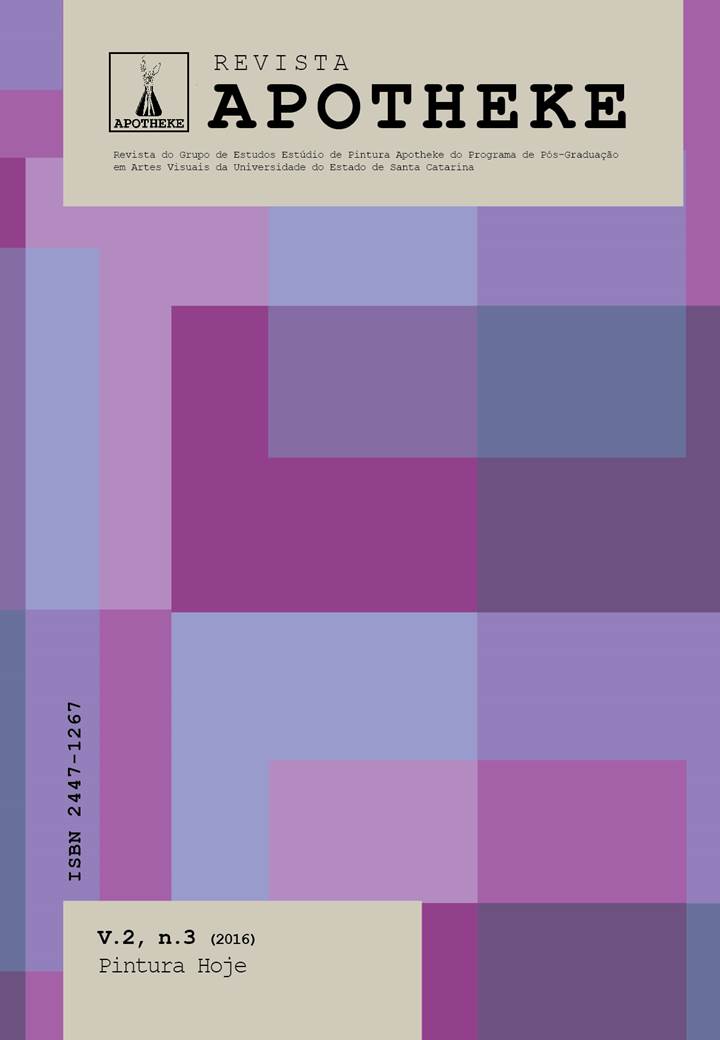[ENTRE] Ação Educativa e a Arte Como Experiência
DOI:
https://doi.org/10.5965/24471267232016254Keywords:
Cultural Mediation , Art as experience, Exeperience aestheticAbstract
This paper presents reflections on the design of educational activities in the cartographic perspective in GillesDeleuze e Félix Guattari (1987), and the assumption of a thought through art as experience, based on John Dewey (2010. The educational material serves as a dialog device, an interface between exposure Wanderings About Painting, Educational Action and Aesthetic Experience, in it, the visitor's of the space gallery, actively contributes to the production of meaning (Rancière, 2014). The authors conceive that there is no a single way of thinking Educational Action and much less a specific way of doing / thinking an educational activity, there are between, hybrid spaces: areas of corporeality, of spatiality, meeting with wealth ambiences, situations and landscapes to be enjoyed and re-created by the spectators. In this sense, the cartographic attitude welcomes the views of the exhibition and recreates new ways of thinking works, providing aesthetic experiences and selfknowledge about artistic productions.
Downloads
References
BACHELARD. Gaston. A poética do espaço. São Paulo: Martins Fontes, 1993.
DEWEY, John. A Arte como experiência. São Paulo: Martins Fontes, 2010.
DEWEY, John . Experiência e Educação. Petrópolis, R.J.: Vozes, 2011.
DEWEY, John. A natureza humana e a conduta: introdução à psicologia social. Bauru: Tipografia e livraria Brasil, 1956.
DELEUZE & GUATTARI. Mil platôs: capitalismo e esquizofrenia, v.
IV. Rio de Janeiro: Ed. 34, 1997.
FREEDMAN, K. Enseñar la cultura visual: cirrículum, estética y la vida socialdel arte. Barcelona: Octaedro, 2006
LISPECTOR, C. Um sopro de vida. São Paulo: Círculo do Livro:1978.
MARTINS, Mirian Celeste. Entre [con]tatos, nuvens e chuviscos mediadores. In: MARTINS, Mirian Celeste (org). Pensar juntos a mediação cultural: [entre]laçando experiiencias e conceitos. São Paulo: Terracota Editora, 2014.
RANCIÈRE, Jacques. O espectador emancipado. São Paulo: Martins Fontes, 2014.
KASTRUP, Virgínia. Cartografias Literárias. Em: Políticas da cognição. Porto Alegre:Sulina, 2008.
VARELA, Francisco. Conhecer: as ciências cognitivas - tendências e perspectivas. Lisboa: Instituto Piaget, (s/d).
Downloads
Published
How to Cite
Issue
Section
License

This work is licensed under a Creative Commons Attribution-NonCommercial 4.0 International License.
Copyright and Licensing Policy
Authors of works submitted to Revista APOTHEKE authorize their publication in both print and digital formats exclusively for academic purposes. Reproduction is permitted, provided that the source is properly cited. Authors confirm the originality, authorship, and unpublished status of their manuscripts.
Articles published by the journal are freely available and intended for academic and non-commercial use only. All copyrights are transferred to the journal. The content of signed articles reflects the views of their respective authors and not the official position of Revista Apotheke. The author(s) agree to always cite the following reference when republishing or referring to the content originally published in Revista Apotheke:
“This article was originally published by Revista Apotheke in volume (insert volume), number (insert number), year (insert year), and is available at: http://www.revistas.udesc.br/index.php/APOTHEKE/index”
It is the sole responsibility of the authors to obtain written permission for the use of any material protected by copyright law included in their articles. Revista Apotheke is not responsible for copyright infringements committed by contributors.
Authors retain copyright and grant the journal the right of first publication, with the work licensed under a Creative Commons Attribution-NonCommercial License (CC BY-NC):
-
Attribution (BY): Licensees are allowed to copy, distribute, display, perform, and create derivative works, provided that proper credit is given to the author or licensor, in the manner specified.
-
NonCommercial (NC): Licensees may use the material only for non-commercial purposes.
After publication, authors retain the rights to their work and may republish the text.



